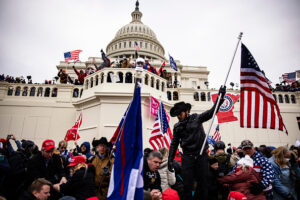
(Photo by Samuel Corum/Getty Images)
This week bipartisan groups filed claims with the State Bar of California and the Office of Disciplinary Counsel in DC against Trumpworld lawyers who attempted to overturn the results of the 2020 election.
You attempt one coup, and they try to cancel culture you. That’s the intolerant left for ya!

Heading To Legalweek? Come Join Above The Law!
Meet the team in NYC at our Monday night happy hour — 3/9 at 7pm. RSVP required.
In California, multiple prominent lawyers demanded an investigation of attorney John Eastman’s campaign to pressure Vice President Pence to throw a wrench in the certification of the electoral votes. And in DC a similarly distinguished group requests that the DC Bar take action against Jeffrey B. Clark, the former acting head of the Justice Department’s Civil Division, for his attempt to get the DOJ to interfere with election certification at the state level.
The California complaint was drafted by the States United Democracy Center, a bipartisan group led by former Republican Gov. Christine Todd Whitman and Obama ethics czar Norm Eisen. It details Eastman’s infamous memo, his peregrinations in December and January trying to gin up support for the laughable theory that the vice president has unilateral authority to overturn an election, and his role in the doomed Texas lawsuit asking the Supreme Court to toss out electoral votes in five swing states.
The signatories allege that John Eastman violated multiple provisions of California’s Rules of Professional Conduct and the State Bar Act by counseling his client to violate the law, misstating the facts and the law to his client and to a tribunal, filing a meritless claim, and failing to uphold the constitution.
“We draw your attention to Mr. Eastman’s conduct as described in public documents and reports because we believe in the importance of protecting the rule of law by holding those who are sworn to defend it accountable under professional standards,” they wrote.

How LexisNexis State Net Uses Gen AI To Tame Gov’t Data
Its new features transform how you can track and analyze the more than 200,000 bills, regulations, and other measures set to be introduced this year.
“Lawyers, particularly those who represent elected and appointed officials, have a solemn duty to the public to advise their clients within the four corners of the law, and to ensure that they do not allow themselves to become the tools by which those officials seek to undermine democratic governance. Our state bars set standards of professional responsibility for their members to ensure that in their zealous defense of their clients, lawyers also serve as the guardians of the rule of law.”
In DC, a group called Lawyers Defending American Democracy demands accountability for Jeffrey Clark, who attempted to persuade his bosses to send a letter to election officials in Georgia — and then the rest of the swing states — urging them to let the legislature override the will of the voters.
“The Department of Justice is investigating various irregularities in the 2020 election for President of the United States,” his proposed draft read. “The Department will update you as we are able on investigatory progress, but at this time we have identified significant concerns that may have impacted the outcome of the election in multiple States, including the State of Georgia.”
Clark even went so far as to invent a legal justification for the state legislature to convene itself if Gov. Brian Kemp wouldn’t summon them, writing, “the Georgia General Assembly has implied authority under the Constitution of the United States to call itself into special session for the limited purpose of considering issues pertaining to the appointment of Presidential Electors.”
In point of fact, the DOJ had investigated the election in Georgia and found no significant fraud, and certainly no irregularities which would have affected the outcome of the election. Which is why acting deputy Attorney General Richard Donoghue responded “[T]here is no chance that I would sign this letter or anything remotely like this,” adding that “I know of nothing that would support the statement, ‘we have identified significant concerns that may have impacted the outcome of the election in multiple states.’”
The complainants call Clark’s attempt to intercede in Georgia a violation of ABA Model Rule 8.4, which says “It is professional misconduct for a lawyer to . . . (c) engage in conduct involving dishonesty, fraud, deceit, or misrepresentation,” conduct made even more egregious by Clark’s position as a government employee charged with enforcing the law.
“These principles apply with special force to government officials and prosecutors who owe a higher duty to the public than ordinary lawyers, government officials having been entrusted with authority granted by the people,” they add.
It’s not clear whether these petitions will go anywhere. A similar complaint against former AG Bill Barr in DC fell flat after the Disciplinary Counsel invented a rule that barred it from wading into political decisions and/or only allowed it to consider allegations made on the basis of “personal knowledge,” rather than news reports. Then Hamilton P. Fox, III, the Disciplinary Counsel, sent a truly bizarre letter hinting that perhaps there were secretly docketed bar complaints hidden from the public.
If so, we’re still waiting to hear about them. But even if these complaints don’t result in official actions, they function as a form of sanction in and of themselves. Eastman and Clark used their authority as respected members of the profession to advocate for lawlessness, and now they’re getting publicly called out by their peers as unworthy of that respect.
Eastman “retired” from his position at Chapman University in light of his role in fomenting the Capitol Insurrection, and his association with the Claremont Institute has been an unending headache for the group. And while Clark has landed on his feet with a cushy gig at the conservative New Civil Liberties Alliance, he’s not being welcomed back to the fold at Kirkland & Ellis where he spent two decades of his career.
Of course it would be better if we had a functioning system to enforce ethical standards in the profession. And frankly, it should have kicked in when Eastman, who still chairs the board of an organization which fights against marriage equality, made the racist argument that VP Harris was ineligible to run because she wasn’t a “real” US citizen.
It shouldn’t fall to an unelected group of famous lawyers to shout “You can’t sit with us!” But barring a real enforcement mechanism, we’ll have to make do with a good old fashioned shunning. And no one deserves it more than Clark and Eastman.
Eastman Complaint
Clark Complaint
Liz Dye lives in Baltimore where she writes about law and politics.